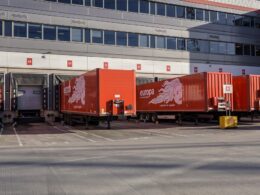Delivery containers and pallets cost thousands – yet many organisations are grinning and bearing the losses as these often ubiquitous transport mechanisms are deserting the frontline rarely to be seen again. So why isn’t more attention paid to the demise of the container in an industry of ever tightening margins?
Most industries today that have a delivery logistics aspect, put their product in a container or on a pallet for delivery. As the margins get tighter and they push for more efficiency, the costs of these pallets and containers start to become significant in the operation of the business. Trying to ensure organisations are efficient and not simply losing these valuable assets is an increasing requirement across multiple industries.
Consider the baking industry, for instance, where trays are used to transport bread; or kegs in the brewing industry; or containers in the bulk mail environment – tracking these expensive containers has become the latest efficiency battleground in an effort to effectively track and maintain an effective delivery frontline without continually having to send in expensive new recruits.
Going AWOL
Containers tend not to be part of a closed loop system where they are counted on and off the lorry, or in and out of the customer’s premises. It is usually left to the customer to be r esponsible for going through a process which ensures the container is accounted for and returned, but what does the customer care – after all, if you want to deliver more product, you’ll just come up with another container surely? Worse still, if these assets are not going AWOL at the customer premises, then they have probably unwittingly deserted to a competitor who is also delivering to the customer and mistook them for theirs, or maybe worse, encouraged them to leave before they were lost.
esponsible for going through a process which ensures the container is accounted for and returned, but what does the customer care – after all, if you want to deliver more product, you’ll just come up with another container surely? Worse still, if these assets are not going AWOL at the customer premises, then they have probably unwittingly deserted to a competitor who is also delivering to the customer and mistook them for theirs, or maybe worse, encouraged them to leave before they were lost.
The mail industry has particular issues here. Royal Mail or other ‘bulk’ mail deliverers have their mail transferred in standard containers. With additional competitors in the industry since it became deregulated, those bulk mail companies are handing over the mail to Royal Mail for final delivery. As they use the same standard containers and bags, there is no easy way to keep track of which container belongs to whom.
Send three and fourpence, we’re going to a dance
Companies are spending hundreds of thousands of pounds a year on containers that get lost too easily – all because of a lack of control, or a breakdown in communication. It is all too easy to lose a few hundred containers if a competitor picks some up by accident, for instance, but not knowing where they are, or how to get them back brings the twin problems of replacement cost and the potential issue of losing revenue through not being able to deliver without the requisite number of containers to hand.
And whilst most industries are still aspiring to figure out how to tie these assets with a barcode or an RFID tag, that is a challenge for another day. RFID is adding a cost and is not yet proven. At this point in time there is no one tracking pallets at the truck level – that level of planning just simply doesn’t exist.
Getting them home safely
The simplest form of solving this is to increase accountability and responsibility. Drivers should know what assets they have on their truck at any one time and what assets are on their customers’ premises, so when the customer signs for the product, they also sign for the asset that the product is delivered on. Keeping track of both the product and the container in one place and on one device, enables full visibility of all the assets in the logistics supply chain.
As margins get ever tighter and delivery schedules ever more demanding, getting your assets home safely could mean the difference between winning or losing.
Pól Sweeney, CTO & Managing Director Europe, Airclic.
www.airclic.com












